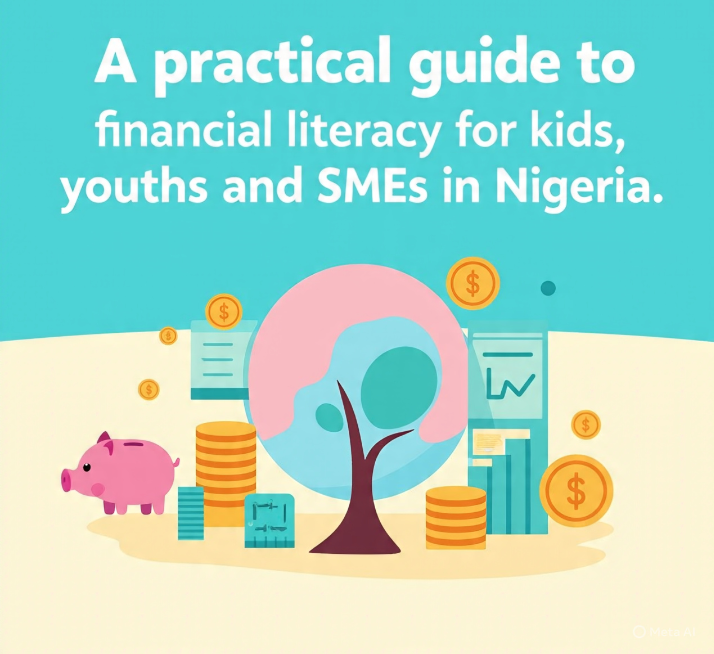📚 Integrating Financial Literacy into Nigeria’s Education Curriculum: Preparing Students and Youth for a Secure Future

Welcome! Are you a Nigerian student or youth feeling left behind by the current educational system when it comes to money? You’re not alone. Our schools do an amazing job of preparing us for exams, but they often leave a huge gap in our education: financial literacy.
In a country where a significant portion of the population is financially illiterate, knowing how to manage your money isn’t just a useful skill; it’s a superpower. This blog is your go-to guide for everything from basic budgeting and saving to smart investing and avoiding financial scams. We’ll demystify finance and equip you with the tools to take control of your financial future, one naira at a time. It’s time to get savvy with your money!
📘 Table of Contents
1. Introduction
2. Why Financial Literacy Matters for Nigerian Students and Youth
3. Current State of Financial Literacy in Nigeria
4. Benefits of Integrating Financial Literacy into the Curriculum
5. Proposed Curriculum Structure and Topics
6. Step by Step Implementation Strategy
7. Data Insights: Financial Literacy Gaps in Nigeria
8. Q&A: Expert Perspectives on Financial Literacy Education
9. How Students and Youth Can Practise Financial Literacy Skills
10. Vital Resources and References
11. Disclaimer
Introduction
In today’s fast changing economy, financial literacy is as essential as reading and writing.
Yet, in Nigeria, millions of young people leave school without the skills to budget, save, invest, or manage debt.
Integrating financial literacy into the national education curriculum can equip students with the tools to make informed money decisions, avoid scams, and build wealth — even in challenging economic conditions.
Why Financial Literacy Matters for Nigerian Students and Youth
• Economic Empowerment – Reduces poverty by teaching income management.
• Entrepreneurship Skills – Prepares youth to start and sustain businesses.
• Financial Inclusion – Encourages use of banking and digital finance tools.
• Resilience Against Economic Shocks – Helps individuals adapt to inflation, currency devaluation, and job market changes.
Current State of Financial Literacy in Nigeria
According to the Central Bank of Nigeria (CBN) and EFInA:
• Only 26% of Nigerian adults are financially literate.
• Youth (ages 15–24) have the lowest financial literacy rates.
• Rural areas lag behind urban centres due to limited access to resources.
Key Gaps:
• Lack of financial education in school curricula.
• Limited teacher training on financial topics.
• Low awareness of digital finance tools.
Benefits of Integrating Financial Literacy into the Curriculum
1. Early Habit Formation – Students learn to budget and save from a young age.
2. Reduced Youth Unemployment – Encourages entrepreneurship and self employment.
3. Better National Economy – A financially literate population makes smarter investment and spending decisions.
4. Increased Tax Compliance – Understanding taxation improves civic responsibility.
Proposed Curriculum Structure and Topics
Financial literacy can be integrated into Civic Education, Economics, Business Studies, and Mathematics.
Core Topics:
• Budgeting and Saving – Personal and household budgeting.
• Banking Basics – How accounts, loans, and interest work.
• Investment Principles – Stocks, bonds, mutual funds, and real estate.
• Entrepreneurship – Starting and managing small businesses.
• Digital Finance – Mobile banking, fintech apps, and online safety.
• Debt Management – Responsible borrowing and credit scores.
• Consumer Rights – Understanding contracts and avoiding fraud.
Step by Step Implementation Strategy
1. Policy Adoption – Federal Ministry of Education to mandate inclusion.
2. Curriculum Development – Collaborate with CBN, SMEDAN, and financial experts.
3. Teacher Training – Workshops and certification for educators.
4. Pilot Programmes – Test in select schools before nationwide rollout.
5. Resource Provision – Textbooks, online modules, and interactive tools.
6. Assessment and Feedback – Regular evaluation of student progress.
7. Public Private Partnerships – Banks and fintechs to sponsor materials and competitions.
Data Insights: Financial Literacy Gaps in Nigeria
Suggested Infographic/Chart:
A bar chart comparing financial literacy rates by age group and region.
Age Group Literacy Rate (%)
15–24 19%
25–34 28%
35–44 32%
45+ 35%
Source: EFInA Access to Financial Services Survey (2024)
Why Financial Literacy Matters for Nigeria
Nigeria’s economy is rich with potential, yet many young people leave school without the tools to navigate personal finance. A lack of exposure to personal finance and financial inclusion often results in poor money decisions, debt traps, and limited opportunities for wealth creation. By introducing financial literacy in schools, the nation can foster youth empowerment while driving long-term economic development.
Curriculum Development for Real-World Impact
Integrating financial education into the existing curriculum should go beyond theory. It must include practical lessons in:
- Budgeting and saving
- Understanding loans and interest rates
- Entrepreneurship and investment opportunities
- Digital banking and financial technology
This approach aligns with the broader goals of education reform, equipping students with 21st-century skills that prepare them to thrive in an increasingly complex financial landscape.
Preparing Youth for Sustainable Development
Nigeria’s future rests on its young population. Embedding youth education in financial literacy not only secures individual prosperity but also promotes sustainable development. A financially literate society can better manage resources, reduce poverty levels, and strengthen national resilience.
Policy and Education Reform
To make this vision a reality, strong education policy is required. Policymakers must collaborate with educators, financial experts, and technology providers to create a dynamic curriculum that meets the evolving needs of students. This reform will ensure that the next generation is well-prepared to make sound financial decisions and contribute to the nation’s economic development.
Q&A: Expert Perspectives on Financial Literacy Education
Q: Why is financial literacy critical for Nigerian youth?
A: Professor Folasade Adefisayo, former Lagos State Commissioner for Education:
“Financial literacy is not just about money; it’s about life skills. It empowers young people to make informed choices that affect their future.”
Q: How can schools make financial literacy engaging?
A: Funso Adegbola, Director, Vale College:
“Use real life simulations — like running a mock business or managing a class budget — to make lessons practical.”
Q: What role can technology play?
A: Angela Omozele Abhulimen, Financial Education Advocate:
“Gamified learning apps and online challenges can make financial education fun and accessible, especially for smartphone savvy youth.”
How Students and Youth Can Practise Financial Literacy Skills
• Start a Savings Challenge – Save ₦500–₦1,000 weekly.
• Track Expenses – Use apps like Cowrywise or PiggyVest.
• Join School Investment Clubs – Learn about stocks and entrepreneurship.
• Volunteer in Community Projects – Gain budgeting and fundraising experience.
• Participate in Financial Literacy Competitions – Many banks sponsor these annually.
Vital Resources and References
• Proposing Strategic Models for Integrating Financial Literacy into Education https://www.researchgate.net/publication/383561533_Proposing_strategic_models_for_integrating_financial_literacy_into_national_public_education_systems
• Financial Literacy and the School Curriculum – CAFEi https://cafei.ng/financial-literacy-and-the-school-curriculum/
• Financial Literacy and the Nigerian Education System – PersonalFinance.ng https://personalfinance.ng/financial-literacy-and-nigerian-education/
• Central Bank of Nigeria – Financial Literacy Framework https://www.cbn.gov.ng/out/2016/cfpd/financial%20literacy.pdf
• EFInA Access to Financial Services in Nigeria 2024 Report https://efina.org.ng/wp-content/uploads/2024/05/EFInA-Snapshot-May-2024.pdf
• Tony Elumelu Foundation – Entrepreneurship Programme https://www.tonyelumelufoundation.org/
Suggested Article on REAL ESTATE INVESTMENT IN NIGERIA VS TREASURY BILLS https://financialliteracy.com.ng/real-estate-investment-in-nigeria-vs-treasury-bills-pros-cons-costs-and-returns/
Conclusion
Financial literacy is more than a skill—it is a life tool. By embedding it into Nigeria’s education curriculum, the country takes a bold step toward student preparedness, financial inclusion, and a stronger economy. Preparing today’s students for tomorrow’s challenges will ensure that Nigerian youth are not only dreamers but also doers, fully equipped to build a secure future.
Disclaimer
financialliteracy.com.ng blog is only an educational enlightenment entity with aim to educate and equip Nigerians on prudent management of their resources and money.
We do not promote affiliate links or run investment portfolio. Do your own research before investing as our contents are meant for educational purposes only.
What is financial literacy? Financial literacy is the possession of skills, knowledge, and behaviours that allow an individual to make informed decisions regarding money. Financial literacy, financial education, and financial knowledge.



